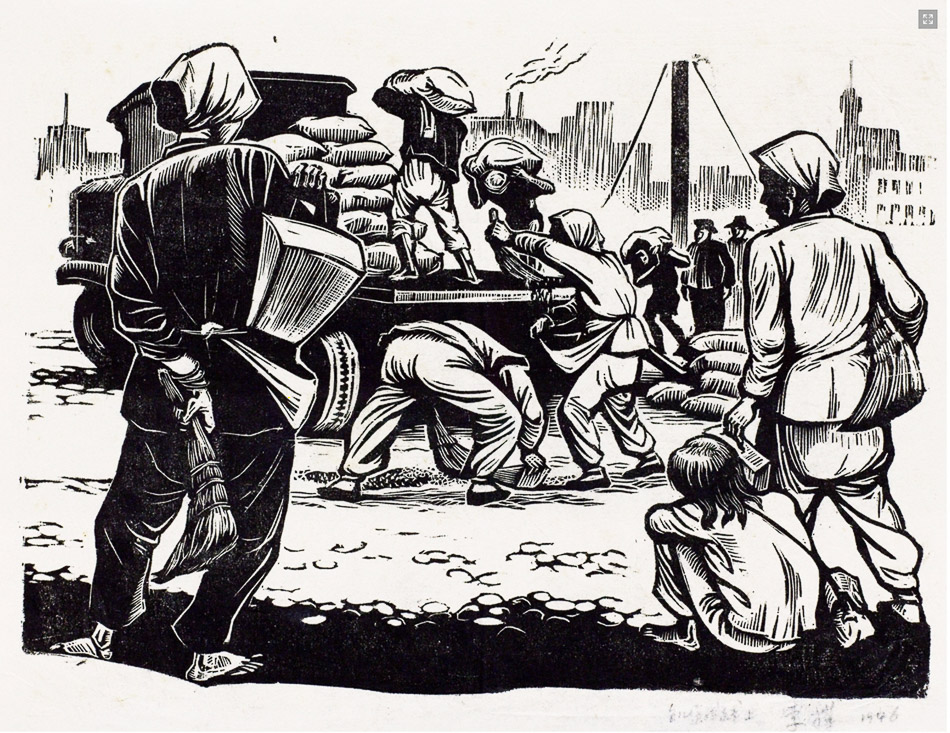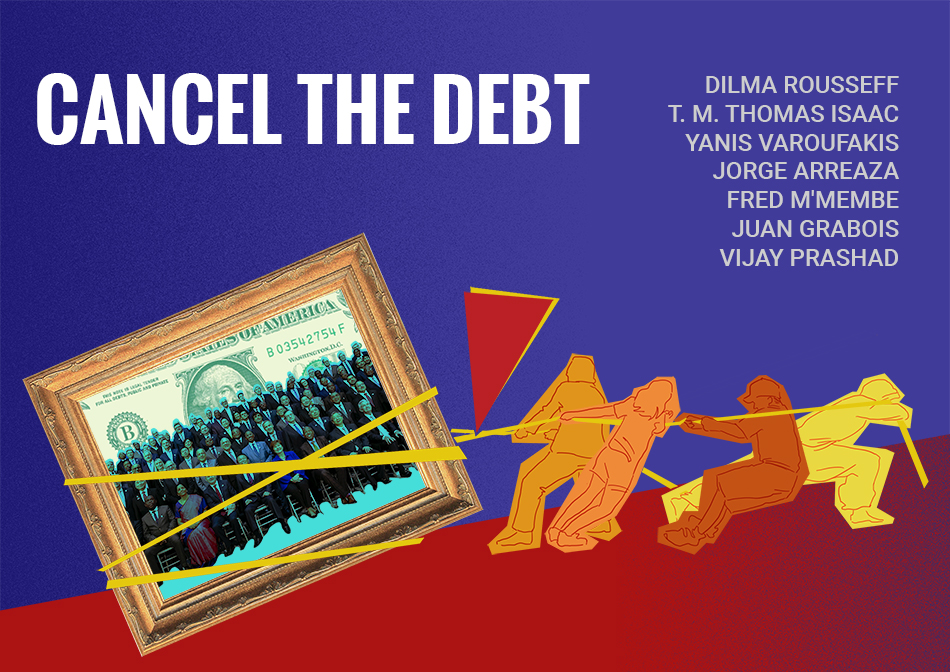In the face of “three pandemics” — coronavirus, unemployment and famine — Vijay Prashad says meager debt-suspension programs are not enough.

Utagawa Kuniyoshi (Japan), Takiyasha the Witch and the Skeleton Spectre, 1849.
By Vijay Prashad
Tricontinental: Institute for Social Research
 On July 18, United Nations Secretary General António Guterres posted the following tweet: “COVID-19 has exposed the lie that free markets can deliver healthcare for all, the fiction that unpaid care work isn’t work, the delusion that we live in a post-racist world. We are all floating on the same sea, but some are in super-yachts and others clinging to drifting debris.”
On July 18, United Nations Secretary General António Guterres posted the following tweet: “COVID-19 has exposed the lie that free markets can deliver healthcare for all, the fiction that unpaid care work isn’t work, the delusion that we live in a post-racist world. We are all floating on the same sea, but some are in super-yachts and others clinging to drifting debris.”
Dr. Rajiv Shah, president of the Rockefeller Foundation (United States), recently said that the United States relies upon two ‘monopoly companies’ (Quest and LabCorp) for Covid-19 testing that “don’t have enough capacity in their central processing systems for the volumes that are necessary right now.”
These monopoly companies – promoted by the free markets that Guterres spoke of – are run on the for-profit motive, which means that they are just-in-time processing laboratories that do not have the “capacity” to do more than normal laboratory work; anything more than that is economically inefficient for them.
Dr. Shah says that the tests cannot be returned in less than a week or two weeks. “With the seven-day lead time,” said Dr. Shah, “you basically aren’t testing at all; it’s the structural equivalent of zero tests.” That means that the United States, with a languishing public sector, is essentially doing no testing. Subin Dennis, a researcher at Tricontinental: Institute for Social Researcher, has written a clear-headed report on the necessity of a strong public sector.

Gilbert & George (Italy/UK), Class War, 1986.
But to build a public sector requires resources. These resources are being drained by the recession triggered by coronavirus, one that is not endogamous to its own economic fundamentals. The various debt suspension programs, such as the Debt Service Suspension Initiative – endorsed by the World Bank and the G20 Finance Ministers – are simply inadequate; a new Oxfam report shows that all of the countries that are eligible for this initiative are still required to pay a minimum of $33.7 billion to service their debts this year.
The amount that is being required of them is $2.8 billion per month, which is “double the amount Uganda, Malawi, and Zambia combined spent on their annual health budget’.
Defaults are on the horizon for a long list of countries. Argentina, Ecuador, and Lebanon have already defaulted. Because of its currency crisis, Lebanon’s medical sector went into chaos. Pharmacies, which import drugs using hard currency, closed; the government failed to reimburse hospitals for services used by patients on social security; and unemployment scuttled access to medical insurance.
With further financial difficulties, these states will once more cut their disbursements to the health sector, scaling back public health services at a time when their value has been clearly demonstrated.
Recently, the UN’s two main agencies that study the situation of food – the World Food Programme (WFP) and the Food and Agriculture Organization (FAO) – released a comprehensive report that showed that in 25 countries, hunger will rise to famine levels. These countries stretch from Haiti to Zimbabwe, from Lebanon to Bangladesh. In April, WFP Director David Beasley said that the situation of hunger risked “a famine of biblical proportions.”
Now, Beasley said that the updated numbers show that “the world’s very poorest families have been forced even closer to the abyss.”
The debt of these countries is simply not allowing them to properly tackle the three pandemics: coronavirus, unemployment, and hunger.

Li Hua (China), Verge of Starvation, 1946.
It is in this context that Dilma Rousseff, T. M. Thomas Isaac, Jorge Arreaza, Yanis Varoufakis, Fred M’membe, Juan Grabois and I released this statement on debt cancellation. We believe that the recession triggered by coronavirus demands far more than milquetoast forms of temporary debt suspension; we believe that debt cancellation is the only way forward in our time of cascading crises.

Statement on Debt Cancellation.
“By all accounts, developing country debt now stands at over $11 trillion. In the remainder of 2020 itself, the debt servicing payments on this debt will amount to $3.9 trillion. This debt has ballooned over the past several decades, leaving most developing countries in an unsustainable financial situation. Defaults and debt adjustments seem to be a permanent fixture amongst developing countries, coming punctually for reasons that are often external to the fundamentals of their economies.
Austerity has become a permanent condition, which is what has weakened the public health systems of so many countries and left them vulnerable to this global pandemic. To continue to service their debt and to be obliged by these debt burdens means that developing countries will not be able to efficiently and effectively tackle the pandemic, nor build the systems necessary for future public health emergencies.
Every dollar in debt servicing that goes to repay a bank or a wealthy bondholder is a dollar that cannot go to buy a ventilator or fund emergency food support. During the CoronaShock crisis, this is both morally indefensible and economically irrational.
Debt suspension or postponement does not provide a foundation for the necessary development of these countries. It merely puts off the reckoning.
It is beyond time for the cancellation of these odious debts, which cannot – in any case – be paid during the coronavirus recession. Both public and private creditors took a risk with their investments. They exploited the needs of developing countries by lending money with obscene interest rates; it is time that they paid the price for this risk rather than force countries with meagre resources to pay out precious capital.
Dilma Rousseff (former President of Brazil).
T. M. Thomas Isaac (Finance Minister, Kerala, India).
Yanis Varoufakis (former Finance Minister, Greece).
Jorge Arreaza (Foreign Minister, Venezuela).
Fred M’membe (President, Socialist Party, Zambia).
Juan Grabois (Frente Patria Grande, Argentina).
Vijay Prashad (Tricontinental: Institute for Social Research).”
We hope that this statement will be widely circulated; that it will be taken up by people’s movements to put pressure on governments not to accept meagre debt suspension agreements that will further trap countries into cycles of long-term insolvency.

Ibrahim El-Salahi (Sudan), Reborn sounds of childhood dreams (1961-65).
Landlocked Malawi won its independence from Britain in 1964 but, rising from a legacy of colonial pillage, emerged as one of the most impoverished countries in the world. David Rubadiri had been Malawi’s first ambassador to both the United States of America and the United Nations and had a front-row seat on the development of underdevelopment; he resigned within a year of his commission. He wrote a poem called “Begging A. I. D.” while teaching in Uganda in 1968:
In the beggarhood
of a circus
that now is home,
the whip of the Ringmaster
cracks with a snap
that eats through
the backs of our being.
Here is the essence of it all: colonialism had been defeated, but its structure has remained, with capital now loaned back at usurious rates and debt leveraged as an instrument of political control over the new nations.
Old images of enslavement had to be recalled making way for the more anonymous forms of social domination. There is no whip in the hand of the Paris Club (the government creditors) or the London Club (the private creditors), nor in the hands of the International Monetary Fund and the World Bank; but its presence is felt beating down on humankind.

Iran Darroudi (Iran), Steadfastness, 1987.
When the Iranian writer Sadeq Hedayat was greeted by friends, he would answer, “we are still in the shackles of life” (dar qeyd-e hayat-im). So we are. That is why the campaign to cancel the odious debts is a good beginning to break these shackles, to cast off the hand that cracks the whip, to break free of the instrument of debt servitude.
Vijay Prashad, an Indian historian, journalist and commentator, is the executive director of Tricontinental: Institute for Social Research and the chief editor of Left Word Books.
This article is from Tricontinental: Institute for Social Research.
The views expressed are solely those of the author and may or may not reflect those of Consortium News.
Please Contribute to Consortium
News on its 25th Anniversary
Donate securely with  PayPal here.
PayPal here.
Or securely by credit card or check by clicking the red button:

I have also just seen Michael Hudson’s article on this topic put up on June 29th at his site.
If Marshall Auerback is right, what I wrote under the recent meritocracy article here was wrong. I tend to see aspects of SARS-CoV-2 in a scarier light than most. I was thinking supply chains would be even more disrupted (if I end up wrong, of course in a way it’ll be a good thing). I was thinking they’d be so badly hit that Vandana Shiva and FDR would start making sense to everybody. But Auerback paints a picture wherein some with money will survive, and continue demanding the high tech gear. His article is “Even If Joe Biden Wins in a Blowout, the ‘Global Economy’ Is Not Coming Back” at nakedcapitalism dot com, 7/25.
Also read a recent interview with Michael Hudson and Ellen Brown describing the “jubilee” debt forgiveness of the past and how it could overcome the present disastrous situation in the world.
And the perfect storm of plagues of biblical proportions now includes this issue as well. I might add also the epidemics here of obesity, drug overdoses, and suicides, and lest we forget the mother of all crises – unmitigated climate disaster. There was a time in history, when the Bible was respected on the issue of usury. It was forbidden, everybody who had Sunday School remembers that Jesus was totally against it. Because of how lucrative it is though, some people were able to manipulate the systems to not only allow it, but to build it up into the driving economic force of our times. It should be clear now, why the ancients considered it a particularly pernicious sin, it’s absolutely devastating and exploitative. There are many candidates for the title of Whip Ringmaster these days. And they are in both political parties. Let’s not forget Biden’s long time alliance with – Credit Card Companies!! And all retail companies now have customers buying their stuff with the store “account”, paying much interest on stuff they used to just buy with cash, it controls everything, from the gas people buy for their cars, to the college courses they take, and of course all the way up to the 2008 crash. To your point, the multi-national bankers were bailed out by the taxpayers, the same principle should be applied to all of this shit.
The debt cancellation must come to pass otherwise we all swim against a tide that wipe us all out . How many of the rich would want to live in a world where the dead and dying lay on the sidewalks of all major cities due to famine and disease because it will be their lot if mankind does not share .
The global debt machine appears to these eyes, to be a creation of illegitimate and corrupt practices and tricks. Approximately thirty “dirty” tricks are outlined in a short work titled “Farming Humans”.
The thirty dirty tricks involve corrupt and criminal ways in which clever men have altered the rules of fairness on which some nations were established. Rules such as “All men are created equal”, and equal before government and with regard to access to justice. The results of the cleverness in which these principles have been altered have the effect of repealing the laws of poverty for thousands of people, while simultaneously repealing the the possibility of prosperity for millions more.
It is a view of a series of clever crimes, when looked at carefully. I tried to do so and to put it into non technical language that anyone could understand in the book, “Farming Humans”, published in 2020.
hXXps://www.amazon.com/Farming-Humans-Money-Larry-Elford/dp/B0884FKNHL
It is time for a debt jubilee (as Michael Hudson has noted, the mark of a functional civilization). This should be global, not just for foreign debt. America is suffering more than it ever has and needs relief.
I understand the arguments for debt relief but please keep the Corona crisis out of it ?
This is a virus that attacks mostly the rich countries with their obsession for expensive drugs and vaccines. Poor countries use cheap, generic drugs with far better results.
Just compare mortality rates of India and Africa to USA and Europe ! Even within Europe take Greece (uses generic treatment) vs. Belgium (prohibits generic treatment)
Quest and L. Corp. act just like what they are as stated up top: monopolies. They certainly have that attitude, in my experience with them. Mr. Gates, I would imagine, admires them.
How about the debt tens of millions of Americans are suffering under due to low wages, exorbitant college tuition and runaway healthcare costs?
The Liberty Bell inscription from Leviticus 25 proclaims it: Declare liberty throwout the land, meaning release the bond servants from debt.
Due to the evil of compound interest, many are trapped in a cycle of ever increasing debt: Farmers, students, victims of pay day lenders and all those who owe more than they can possibly pay.
throughout the land.